Publications
Total 101건
-
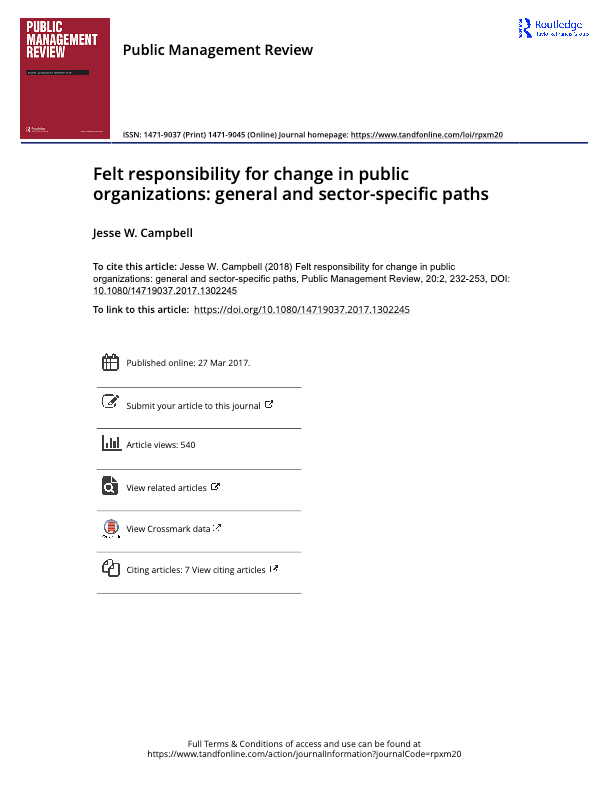 Jesse W. Campbell. (2018) Felt responsibility for change in public organizations: general and sector-specific paths Public Management Review. 20(2), 232-253
Jesse W. Campbell. (2018) Felt responsibility for change in public organizations: general and sector-specific paths Public Management Review. 20(2), 232-253Employees may be a source of performance-enhancing innovation or an obstacle to its implementation. This article develops a model of felt responsibility for change that integrates general and public sector-specific components. Structural equation modelling using survey data collected from Korean government employees suggests that both transformational leadership and performance-based incentives influence change attitudes by strengthening an organization’s climate for innovation. The analysis also suggests that transformational leadership wields influence through reinforcing public service motivation. It is argued that this path is uniquely relevant to the implementation of reform in the public sector.
2024-03-22
Read More -
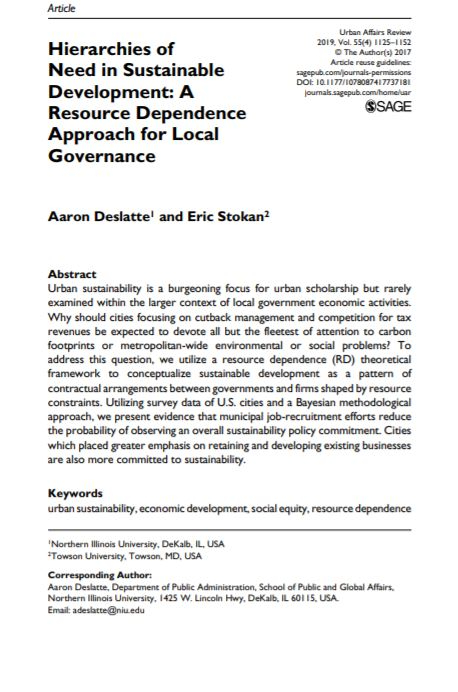 Deslatte, A., & Stokan, E. (2017) Hierarchies of need in sustainable development: A resource dependence approach for local governance Urban Affairs Review. 55(4): 1125-1152
Deslatte, A., & Stokan, E. (2017) Hierarchies of need in sustainable development: A resource dependence approach for local governance Urban Affairs Review. 55(4): 1125-1152Abstract Urban sustainability is a burgeoning focus for urban scholarship but rarely examined within the larger context of local government economic activities. Why should cities focusing on cutback management and competition for tax revenues be expected to devote all but the fleetest of attention to carbon footprints or metropolitan-wide environmental or social problems? To address this question, we utilize a resource dependence (RD) theoretical framework to conceptualize sustainable development as a pattern of contractual arrangements between governments and firms shaped by resource constraints. Utilizing survey data of U.S. cities and a Bayesian methodological approach, we present evidence that municipal job-recruitment efforts reduce the probability of observing an overall sustainability policy commitment. Cities which placed greater emphasis on retaining and developing existing businesses are also more committed to sustainability.
2024-03-22
Read More -
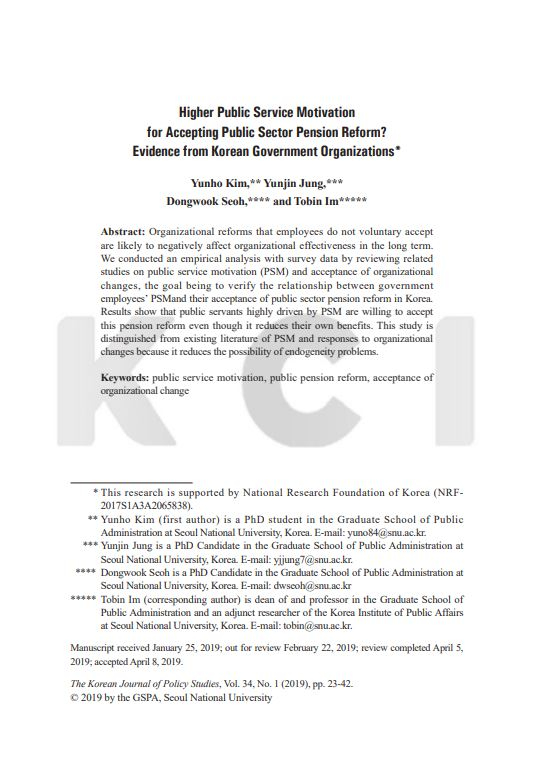 Kim, Y., Jung, Y., Seoh, D., & Im, T. (2019) Higher Public Service Motivation for Accepting Public Sector Pension Reform? Evidence from Korean Government Organizations. The Korean Journal of Policy Studies . 34(1): 23-42
Kim, Y., Jung, Y., Seoh, D., & Im, T. (2019) Higher Public Service Motivation for Accepting Public Sector Pension Reform? Evidence from Korean Government Organizations. The Korean Journal of Policy Studies . 34(1): 23-42[Abstract] Organizational reforms that employees do not voluntary accept are likely to negatively affect organizational effectiveness in the long term. We conducted an empirical analysis with survey data by reviewing related studies on public service motivation (PSM) and acceptance of organizational changes, the goal being to verify the relationship between government employees’ PSMand their acceptance of public sector pension reform in Korea. Results show that public servants highly driven by PSM are willing to accept this pension reform even though it reduces their own benefits. This study is distinguished from existing literature of PSM and responses to organizational changes because it reduces the possibility of endogeneity problems. [Keyword] public service motivation , public pension reform , acceptance of organizational change
2024-03-22
Read More -
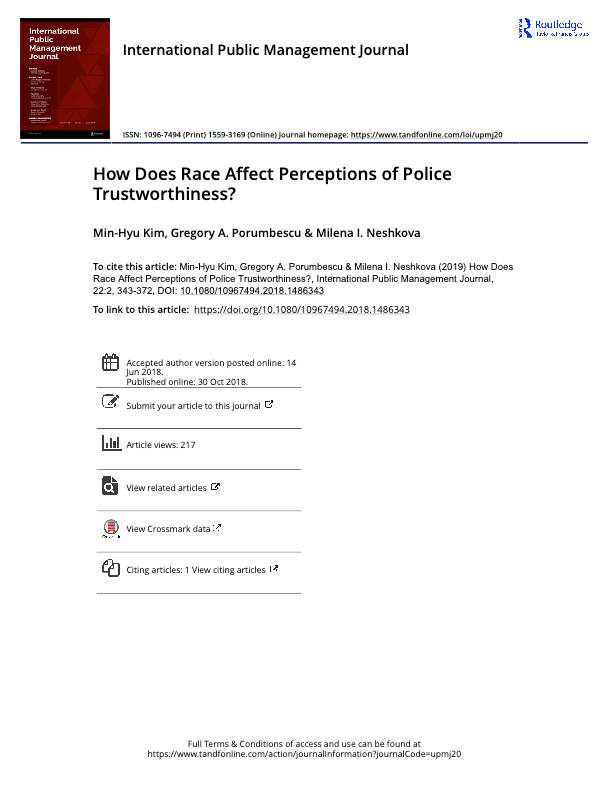 Kim,Min-Hyu , Porumbescu, G.A. & Neshkova, M.I.. (2019) How Does Race Affect Perceptions of Police Trustworthiness? International Public Management Journal. 22(2), 343-372
Kim,Min-Hyu , Porumbescu, G.A. & Neshkova, M.I.. (2019) How Does Race Affect Perceptions of Police Trustworthiness? International Public Management Journal. 22(2), 343-372While race is often discussed in relation to police, there is still little empirical evidence on the role of race in shaping citizens’ evaluations of government performance. Using an experimental design, this study examines how different levels of police performance affect perceptions of police trustworthiness and to which degree observed effects vary by individual race and across communities with different racial makeups. Specifically, we study the effect of different levels of performance on perceived trustworthiness in two communities—one predominantly African American and one predominantly White—and replicate across two samples: a sample consisting of primarily White participants and another consisting of only African American participants. Results indicate that the interaction between the racial composition of a community and individual race plays a critical role in shaping the effects of performance among White participants, who appeared more sensitive to community context than African American participants. Implications for research and practice are discussed.
2024-03-22
Read More -
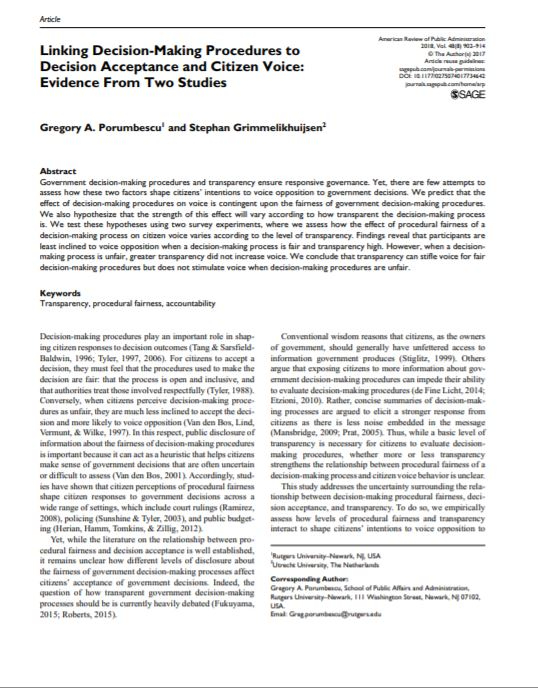 Porumbescu, G. A., & Grimmelikhuijsen, S. (2018) Linking Decision-Making Procedures to Decision Acceptance and Citizen Voice: Evidence From Two Studies The American Review of Public Administration. 48(8), 902-914
Porumbescu, G. A., & Grimmelikhuijsen, S. (2018) Linking Decision-Making Procedures to Decision Acceptance and Citizen Voice: Evidence From Two Studies The American Review of Public Administration. 48(8), 902-914[Abstract] Government decision-making procedures and transparency ensure responsive governance. Yet, there are few attempts to assess how these two factors shape citizens’ intentions to voice opposition to government decisions. We predict that the effect of decision-making procedures on voice is contingent upon the fairness of government decision-making procedures. We also hypothesize that the strength of this effect will vary according to how transparent the decision-making process is. We test these hypotheses using two survey experiments, where we assess how the effect of procedural fairness of a decision-making process on citizen voice varies according to the level of transparency. Findings reveal that participants are least inclined to voice opposition when a decision-making process is fair and transparency high. However, when a decision making process is unfair, greater transparency did not increase voice. We conclude that transparency can stifle voice for fair decision-making procedures but does not stimulate voice when decision-making procedures are unfair.
2024-03-22
Read More -
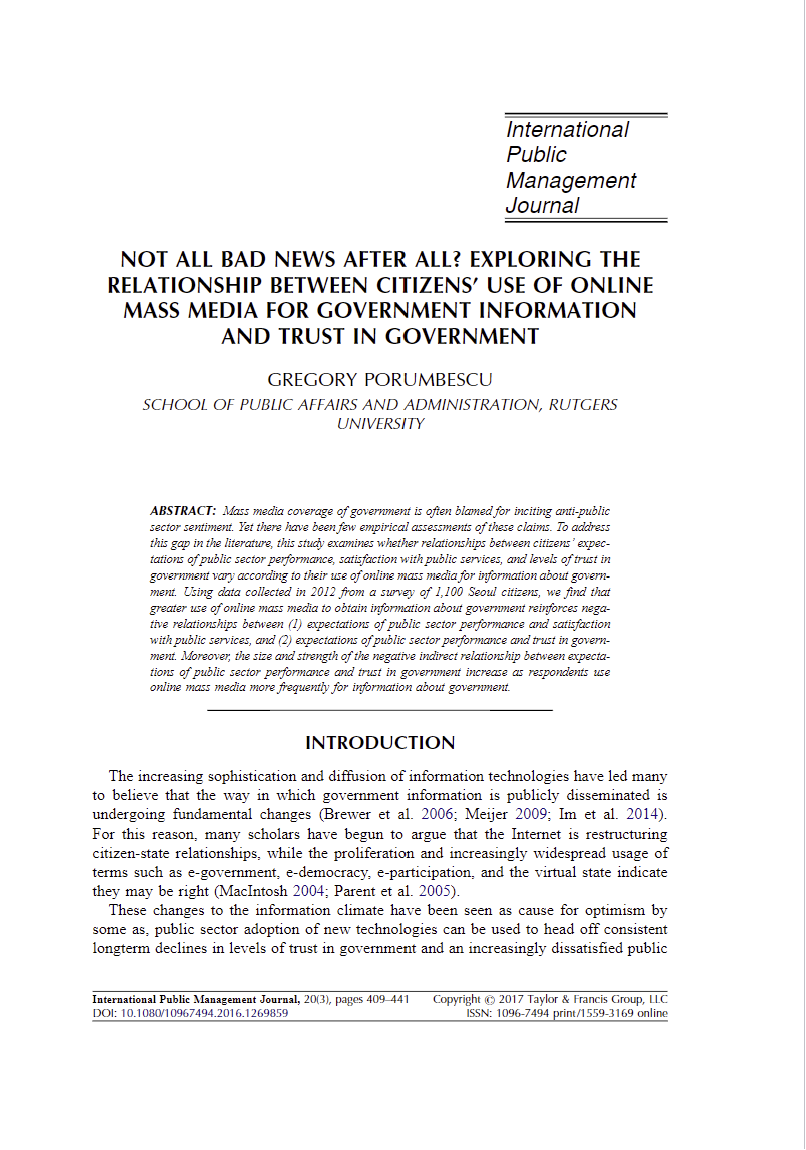 Gregory Porumbescu. (2017) Not All Bad News After All? Exploring the Relationship Between Citizens’ Use of Online Mass Media for Government Information and Trust in Governmen 20(3), 409-441
Gregory Porumbescu. (2017) Not All Bad News After All? Exploring the Relationship Between Citizens’ Use of Online Mass Media for Government Information and Trust in Governmen 20(3), 409-441ABSTRACT Mass media coverage of government is often blamed for inciting anti-public sector sentiment. Yet there have been few empirical assessments of these claims. To address this gap in the literature, this study examines whether relationships between citizens’ expectations of public sector performance, satisfaction with public services, and levels of trust in government vary according to their use of online mass media for information about government. Using data collected in 2012 from a survey of 1,100 Seoul citizens, we find that greater use of online mass media to obtain information about government reinforces negative relationships between (1) expectations of public sector performance and satisfaction with public services, and (2) expectations of public sector performance and trust in government. Moreover, the size and strength of the negative indirect relationship between expectations of public sector performance and trust in government increase as respondents use online mass media more frequently for information about government.
2024-03-22
Read More -
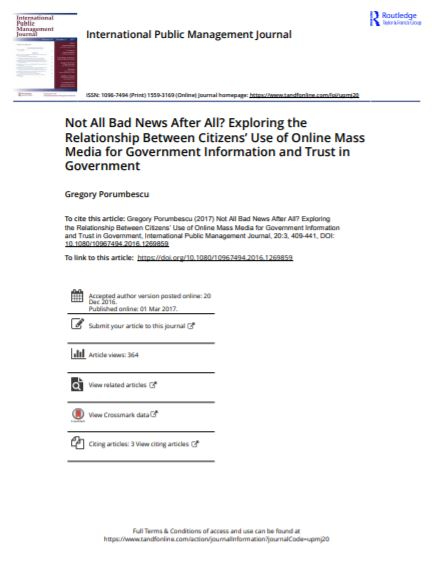 Porumbescu, G. (2017) Not all bad news after all? Exploring the relationship between citizens’ use of online mass media for government information and trust in government. International Public Management Journal. 20(3), 409-441
Porumbescu, G. (2017) Not all bad news after all? Exploring the relationship between citizens’ use of online mass media for government information and trust in government. International Public Management Journal. 20(3), 409-441Mass media coverage of government is often blamed for inciting anti-public sector sentiment. Yet there have been few empirical assessments of these claims. To address this gap in the literature, this study examines whether relationships between citizens’ expectations of public sector performance, satisfaction with public services, and levels of trust in government vary according to their use of online mass media for information about government. Using data collected in 2012 from a survey of 1,100 Seoul citizens, we find that greater use of online mass media to obtain information about government reinforces negative relationships between (1) expectations of public sector performance and satisfaction with public services, and (2) expectations of public sector performance and trust in government. Moreover, the size and strength of the negative indirect relationship between expectations of public sector performance and trust in government increase as respondents use online mass media more frequently for information about government.
2024-03-22
Read More -
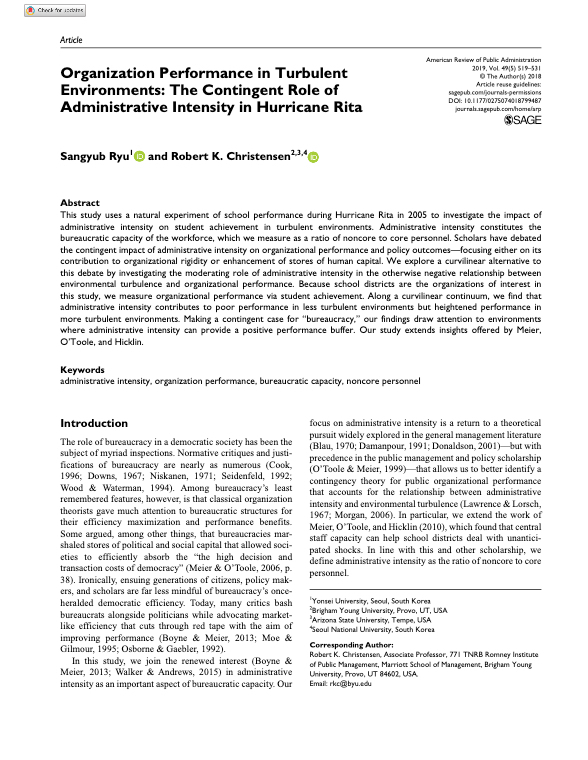 Ryu, S. & Christensen, R. K. (2019) Organization Performance in Turbulent Environments: The Contingent Role of Administrative Intensity in Hurricane Rita The American Review of Public Administration. 49(5), 519–531
Ryu, S. & Christensen, R. K. (2019) Organization Performance in Turbulent Environments: The Contingent Role of Administrative Intensity in Hurricane Rita The American Review of Public Administration. 49(5), 519–531This study uses a natural experiment of school performance during Hurricane Rita in 2005 to investigate the impact of administrative intensity on student achievement in turbulent environments. Administrative intensity constitutes the bureaucratic capacity of the workforce, which we measure as a ratio of noncore to core personnel. Scholars have debated the contingent impact of administrative intensity on organizational performance and policy outcomes—focusing either on its contribution to organizational rigidity or enhancement of stores of human capital. We explore a curvilinear alternative to this debate by investigating the moderating role of administrative intensity in the otherwise negative relationship between environmental turbulence and organizational performance. Because school districts are the organizations of interest in this study, we measure organizational performance via student achievement. Along a curvilinear continuum, we find that administrative intensity contributes to poor performance in less turbulent environments but heightened performance in more turbulent environments. Making a contingent case for “bureaucracy,” our findings draw attention to environments where administrative intensity can provide a positive performance buffer. Our study extends insights offered by Meier, O’Toole, and Hicklin. Keywords administrative intensity, organization performance, bureaucratic capacity, noncore personnel
2024-03-22
Read More -
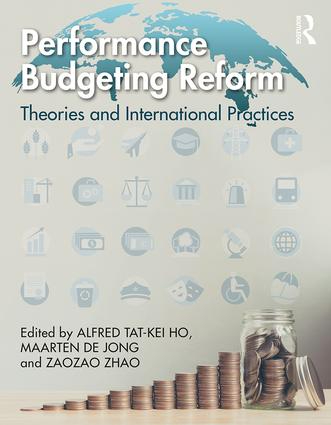 Tobin Im, Jay H. Kwon. (2019) Performance Budgeting Reform Theories and International Practices London:Routledge. Section 2, Chapter 6. Linking Strategic Planning with Performance- Based Budgeting: Republic of Korea Under the Developmental- State Era
Tobin Im, Jay H. Kwon. (2019) Performance Budgeting Reform Theories and International Practices London:Routledge. Section 2, Chapter 6. Linking Strategic Planning with Performance- Based Budgeting: Republic of Korea Under the Developmental- State Era[Abstract] Using theoretical frameworks to explore the political, organizational, and cultural dynamics of performance budgeting, this book examines the adoption of performance budgeting in a variety of countries, how it has been implemented, and why it succeeded or failed. Chapters include case studies from a wide range of continents and regions including the U.S., Africa, Asia, Australia, Europe, Latin America, and the Middle East. Each case study pays careful attention to the unique historical, political, and cultural contexts of reform and closely examines how performance informed the budgetary process. Chapters investigate theory-driven analysis, focusing on common themes related to international policy diffusion, organizational change, stakeholder politics and gaming, communication and information management, principal–agent dynamics, and institutional constraints. Contributors include both scholars and seasoned practitioners with extensive experience in implementing or advising performance budgeting reforms. With emphases on both theories and practices, this book is written for graduate courses in public budgeting and comparative public administration, providing theoretical insights into budgeting reforms in developing countries, as well as practice-relevant and actionable recommendations for current and future policymakers and budget reformers. [Contents] List of figures List of tables List of contributors Section I. Theories of Performance Budgeting 1. Rethinking Performance Budgeting: Presumed Dead or Alive and Well? Alfred T. Ho, University of Kansas, USA and Maarten de Jong, VU University Amsterdam, the Netherlands 2. Six Theoretical Perspectives on Performance Budgeting Alfred T. Ho, University of Kansas, USA 3. Budget Reform Dynamics and Conceptualization of Reform Space Maarten de Jong, VU University Amsterdam, the Netherlands Section II. Synthesizing Lessons from High-Income Countries 4. Performance Budgeting in the U.S: A Long History of Institutional Change Alfred T. Ho, University of Kansas, USA 5. The Evolution of Performance Budgeting amidst Other Public Financial Management Reforms in Australia and the Netherlands Andrew Podger, Australia National University, Australia, and Maarten de Jong, VU University Amsterdam, the Netherlands 6. Linking Strategic National Planning with Performance-Based Budgeting: Republic of Korea Under the Developmental-State Era Tobin Im and Jay H. Kwon, Seoul National University, South Korea 7. Lessons about Integrating Performance with Budgeting in High-Income Countries: An Evolving Exercise Maarten de Jong, VU University Amsterdam, the Netherlands, and Alfred T. Ho, University of Kansas, USA Section III. Synthesizing Lessons from Low and Middle-Income Countries 8. The Long History of Performance Budgeting in the Philippines Mary Venner, University of Canberra, Australia 9. Performance-based Budgeting System and Performance Evaluation in Mexico Edgar E. Romirez and Gabriel Puron-Cid, Center for Research and Teaching in Economics (CIDE), Mexico 10. The Evolution of Performance Budgeting Reform in Chile Juan Pablo Martínez Guzmán, University of Maryland, USA 11. Performance Budgeting Reform in Indonesia: Brief History, Progress, and Lessons Learned Aichiro Suryo Prabowo, University of Indonesia, Indonesia 12. The Evolution of Performance Budgeting Initiative in Guangdong, China Wenbin Li, South China University of Technology, China 13. Performance Budgeting Reform of a Chinese City: The Roles of External Pressure and Leadership Zaozao Zhao, the National Academy of Economic Strategy, the Chinese Academy of Social Sciences, PRC and Alfred T. Ho, University of Kansas, USA 14. Third-Party Evaluation and Performance Budgeting Reform: A Chinese Case Study Zaozao Zhao, the Chinese Academy of Social Sciences, and Wen Fan, Dataway Horizon, China 15. Performance Budgeting in Kenya: Challenges of Institutional Change and Communication Processes Frankline Muthomi and Kurt Thurmaier, Northern Illinois University, USA 16. Performance Budgeting Reform in Tunisia Maarten de Jong, VU University Amsterdam, the Netherlands 17. Performance Budgeting Challenges in Developing Countries: A Case Study of Afghanistan Mary Venner, University of Canberra, Australia 18. Lessons for Low- and Middle-Income Countries: Right-Sizing the Reform Alfred T. Ho, University of Kansas, USA, and Maarten de Jong, VU University Amsterdam, the Netherlands Section IV. The Future of Performance Budgeting Reform 19. From Practice to Theory: The Future of Performance Budgeting Research Alfred T. Ho, University of Kansas, USA, and Maarten de Jong, VU University Amsterdam, the Netherlands 20. Tools of Performance Budgeting: Applying the Lessons Learned Maarten de Jong, VU University Amsterdam, the Netherlands, and Alfred T. Ho, University of Kansas, USA
2024-03-22
Read More -
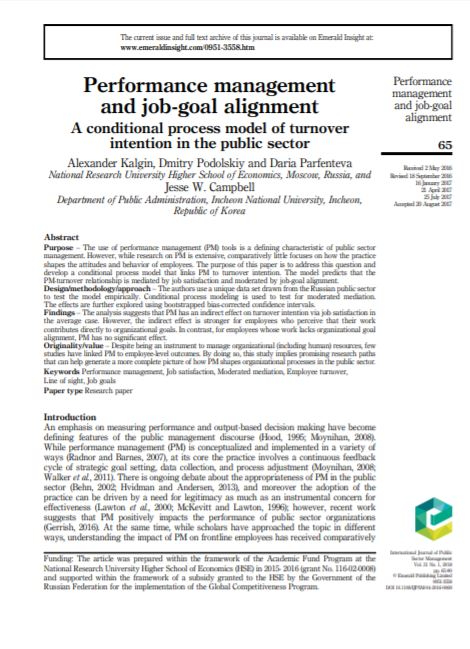 Kalgin, A., Podolskiy, D., Parfenteva, D., & Campbell, J. W. (2018) Performance management and job-goal alignment: A conditional process model of turnover intention in the public sector International Journal of Public Sector Management. 31(1), 65-80
Kalgin, A., Podolskiy, D., Parfenteva, D., & Campbell, J. W. (2018) Performance management and job-goal alignment: A conditional process model of turnover intention in the public sector International Journal of Public Sector Management. 31(1), 65-80[Abstract] Purpose – The use of performance management (PM) tools is a defining characteristic of public sector management. However, while research on PM is extensive, comparatively little focuses on how the practice shapes the attitudes and behavior of employees. The purpose of this paper is to address this question and develop a conditional process model that links PM to turnover intention. The model predicts that the PM-turnover relationship is mediated by job satisfaction and moderated by job-goal alignment. Design/methodology/approach – The authors use a unique data set drawn from the Russian public sector to test the model empirically. Conditional process modeling is used to test for moderated mediation. The effects are further explored using bootstrapped bias-corrected confidence intervals. Findings – The analysis suggests that PM has an indirect effect on turnover intention via job satisfaction in the average case. However, the indirect effect is stronger for employees who perceive that their work contributes directly to organizational goals. In contrast, for employees whose work lacks organizational goal alignment, PM has no significant effect. Originality/value – Despite being an instrument to manage organizational (including human) resources, few studies have linked PM to employee-level outcomes. By doing so, this study implies promising research paths that can help generate a more complete picture of how PM shapes organizational processes in the public sector.
2024-03-22
Read More -
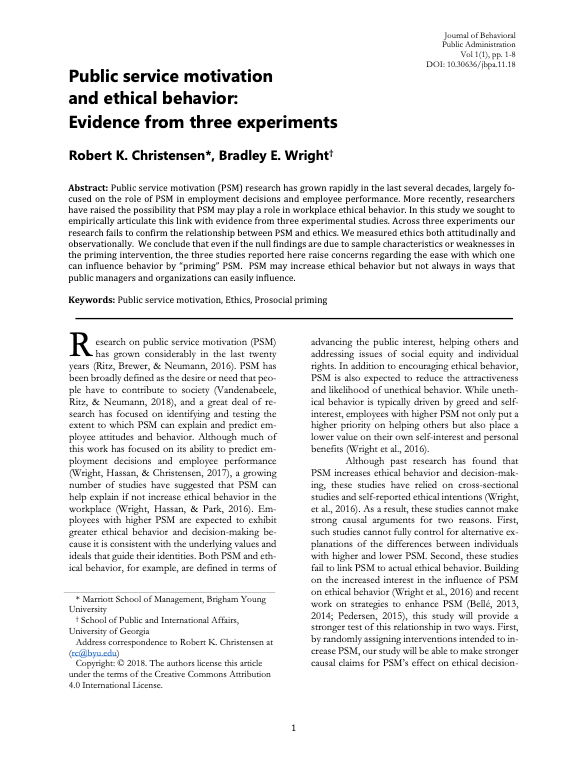 Christensen, R. K., & Wright, B. E. (2018) Public service motivation and ethical behavior: Evidence from three experiments Journal of Behavioral Public Administration. 1(1), 1-8
Christensen, R. K., & Wright, B. E. (2018) Public service motivation and ethical behavior: Evidence from three experiments Journal of Behavioral Public Administration. 1(1), 1-8Public service motivation (PSM) research has grown rapidly in the last several decades, largely focused on the role of PSM in employment decisions and employee performance. More recently, researchers have raised the possibility that PSM may play a role in workplace ethical behavior. In this study we sought to empirically articulate this link with evidence from three experimental studies. Across three experiments our research fails to confirm the relationship between PSM and ethics. We measured ethics both attitudinally and observationally. We conclude that even if the null findings are due to sample characteristics or weaknesses in the priming intervention, the three studies reported here raise concerns regarding the ease with which one can influence behavior by "priming" PSM. PSM may increase ethical behavior but not always in ways that public managers and organizations can easily influence.
2024-03-22
Read More -
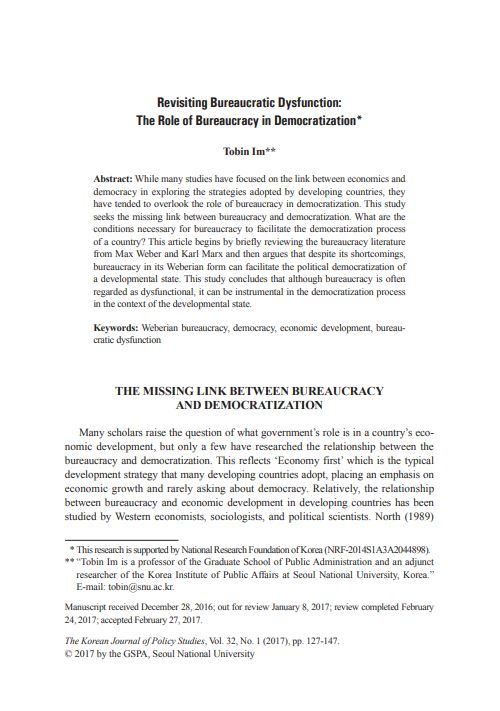 Tobin, Im. (2017) Revisiting Bureaucratic Dysfunction: The Role of Bureaucracy in Democratization The Korean Journal of Policy Studies . 32(1) 127-147
Tobin, Im. (2017) Revisiting Bureaucratic Dysfunction: The Role of Bureaucracy in Democratization The Korean Journal of Policy Studies . 32(1) 127-147[Abstract] While many studies have focused on the link between economics and democracy in exploring the strategies adopted by developing countries, they have tended to overlook the role of bureaucracy in democratization. This study seeks the missing link between bureaucracy and democratization. What are the conditions necessary for bureaucracy to facilitate the democratization process of a country? This article begins by briefly reviewing the bureaucracy literature from Max Weber and Karl Marx and then argues that despite its shortcomings, bureaucracy in its Weberian form can facilitate the political democratization of a developmental state. This study concludes that although bureaucracy is often regarded as dysfunctional, it can be instrumental in the democratization process in the context of the developmental state. [Keywords] Weberian bureaucracy, democracy, economic development, bureaucratic dysfunction
2024-03-22
Read More -
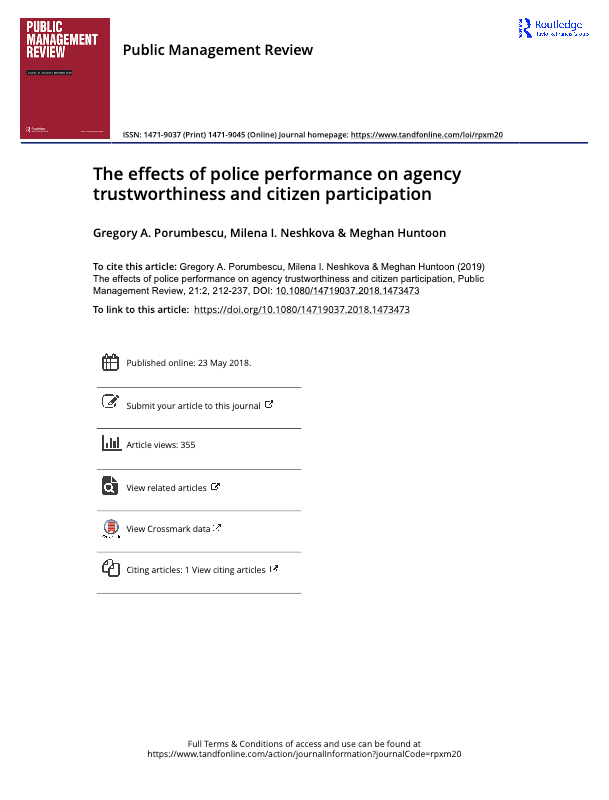 Porumbescu, G. A., Neshkova, M.I. & Huntoon, M.. (2019) The Effects of Police Performance On Agency Trustworthiness and Citizen Participation Public Management Review. 21(2), 212-237
Porumbescu, G. A., Neshkova, M.I. & Huntoon, M.. (2019) The Effects of Police Performance On Agency Trustworthiness and Citizen Participation Public Management Review. 21(2), 212-237We examine the effect of performance information on citizens’ willingness to engage with government. We hypothesize that when performance information is positive, citizens perceive government as trustworthy, which increases proclivity for participation. To validate this framework, we conduct an experiment that tests the effect of police performance on citizens’ perceptions of police trustworthiness and intentions to participate in a neighbourhood watch programme. We find that information about police performance strongly affects perceptions of police trustworthiness. Yet, citizen decisions to participate in the community watch programme are more complex and can be triggered by either positive or negative police performance.
2024-03-22
Read More -
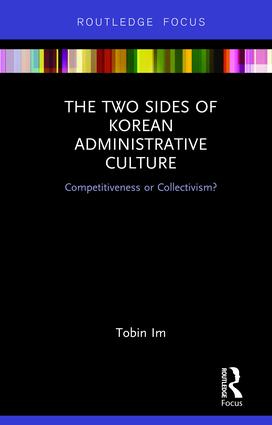 Tobin, Im. (2019) The Two Sides of Korean Administrative Culture: Competitiveness or Collectivism? London:Routledge.
Tobin, Im. (2019) The Two Sides of Korean Administrative Culture: Competitiveness or Collectivism? London:Routledge.This book explores two contradictory aspects of the Korean culture: competitiveness and collectivism. These two major concepts describe the dynamics of Korean public organizations, which explain the Hangang RiverEconomic Miracle and political democratization. However, not many studies have focused on how competition within the central government, that is, competition among different agencies, has led to an overall competitive government. This book attempts to do so and explains how competition contributed to the rapid economic growth of Korea. [Contents] 1. Competition: A Novel Concept? 2. Competition Traits as Psychological Drivers 3. Competition Within an Organization 4. Competing with an Organization 5. Governance from the Competition Perspective 6. Competition and Governance in the Future
2024-03-22
Read More -
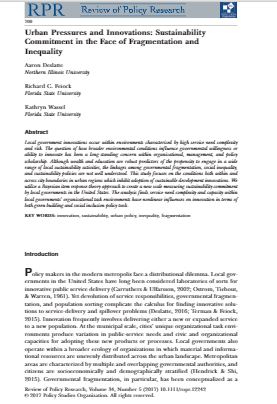 Deslatte, A., Feiock, R. C., & Wassel, K. (2017) Urban pressures and innovations: Sustainability commitment in the face of fragmentation and inequality. Review of Policy Research Review of Policy Research. 34(5), 700-724
Deslatte, A., Feiock, R. C., & Wassel, K. (2017) Urban pressures and innovations: Sustainability commitment in the face of fragmentation and inequality. Review of Policy Research Review of Policy Research. 34(5), 700-724Abstract Local government innovations occur within environments characterized by high service‐need complexity and risk. The question of how broader environmental conditions influence governmental willingness or ability to innovate has been a long‐standing concern within organizational, management, and policy scholarship. Although wealth and education are robust predictors of the propensity to engage in a wide range of local sustainability activities, the linkages among governmental fragmentation, social inequality, and sustainability policies are not well understood. This study focuses on the conditions both within and across city boundaries in urban regions which inhibit adoption of sustainable development innovations. We utilize a Bayesian item response theory approach to create a new scale measuring sustainability commitment by local governments in the United States. The analysis finds service‐need complexity and capacity within local governments' organizational task environments have nonlinear influences on innovation in terms of both green building and social inclusion policy tools.
2024-03-22
Read More -
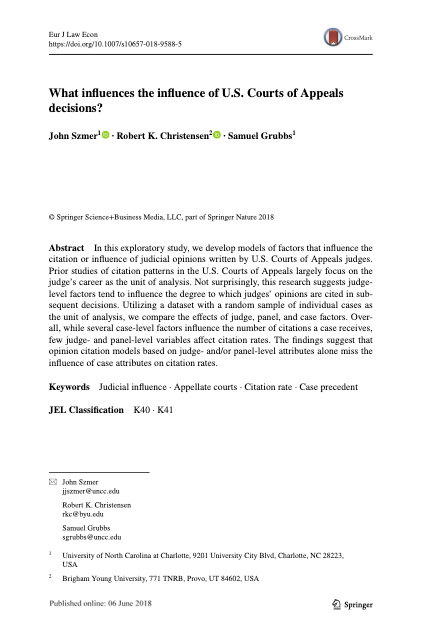 Szmer, J., Christensen, R.K., & Grubbs, S.J. (2018) What influences the influence of U.S. Courts of Appeals decisions? European Journal of Law and Economics. 1-27
Szmer, J., Christensen, R.K., & Grubbs, S.J. (2018) What influences the influence of U.S. Courts of Appeals decisions? European Journal of Law and Economics. 1-27In this exploratory study, we develop models of factors that influence the citation or influence of judicial opinions written by U.S. Courts of Appeals judges. Prior studies of citation patterns in the U.S. Courts of Appeals largely focus on the judge’s career as the unit of analysis. Not surprisingly, this research suggests judge-level factors tend to influence the degree to which judges’ opinions are cited in subsequent decisions. Utilizing a dataset with a random sample of individual cases as the unit of analysis, we compare the effects of judge, panel, and case factors. Overall, while several case-level factors influence the number of citations a case receives, few judge- and panel-level variables affect citation rates. The findings suggest that opinion citation models based on judge- and/or panel-level attributes alone miss the influence of case attributes on citation rates.
2024-03-22
Read More -
 Kroll, A., & Porumbescu, G. A. (2017 ) When Extrinsic Rewards Become “Sour Grapes” An Experimental Study of Adjustments in Intrinsic and Prosocial Motivation Review of Public Personnel Administration. 39(4), 467-486
Kroll, A., & Porumbescu, G. A. (2017 ) When Extrinsic Rewards Become “Sour Grapes” An Experimental Study of Adjustments in Intrinsic and Prosocial Motivation Review of Public Personnel Administration. 39(4), 467-486[Abstract] This article challenges conventional wisdom put forward by the motivational crowding literature by examining whether hypothetical changes to incentive structures can cause variation in employee motivation. It links such motivational adjustments to theories of cognitive dissonance and self-rationalization, and thereby offers a more nuanced perspective on government reforms in the area of human resource management. The article puts forward the idea that expectations of few extrinsic rewards can raise employees’ levels of intrinsic and prosocial motivation; this response is seen as a cognitive coping mechanism to self-justify the value of one’s work. A randomized experiment with 129 public administration students provides partial evidence for the hypothesized effect. Students who were confronted with media information suggesting that few extrinsic rewards can be expected in a public-sector career reported higher scores of intrinsic motivation than the group whose vignette suggested the opposite. No effect was found with regard to students’ public service motivation.
2024-03-22
Read More -
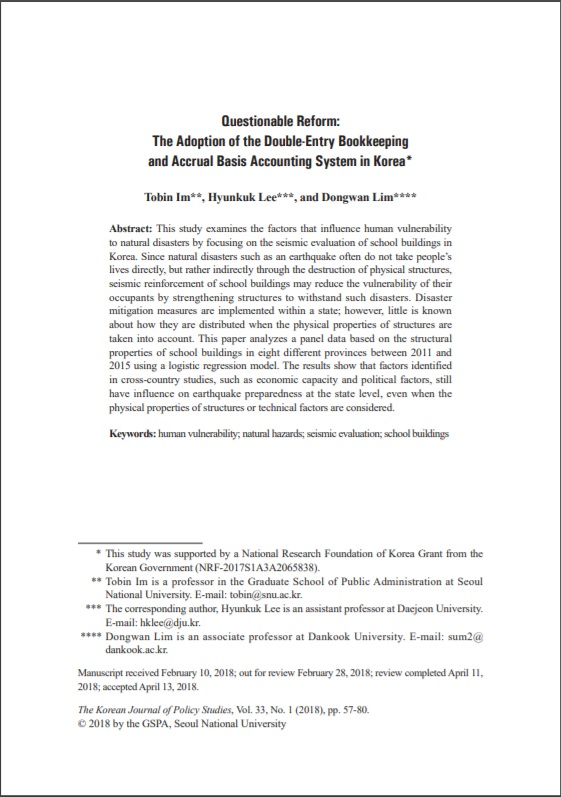 Im, T., & Lee, H., & Lim, D.. (2018) Questionable Reform: The Adoption of the Double-Entry Bookkeeping and Accrual Basis Accounting System in Korea The Korean Journal of Policy Studies. 57-80(23p)
Im, T., & Lee, H., & Lim, D.. (2018) Questionable Reform: The Adoption of the Double-Entry Bookkeeping and Accrual Basis Accounting System in Korea The Korean Journal of Policy Studies. 57-80(23p)[Abstract] This study examines the factors that influence human vulnerability to natural disasters by focusing on the seismic evaluation of school buildings in Korea. Since natural disasters such as an earthquake often do not take people’s lives directly, but rather indirectly through the destruction of physical structures, seismic reinforcement of school buildings may reduce the vulnerability of their occupants by strengthening structures to withstand such disasters. Disaster mitigation measures are implemented within a state; however, little is known about how they are distributed when the physical properties of structures are taken into account. This paper analyzes a panel data based on the structural properties of school buildings in eight different provinces between 2011 and 2015 using a logistic regression model. The results show that factors identified in cross-country studies, such as economic capacity and political factors, still have influence on earthquake preparedness at the state level, even when the physical properties of structures or technical factors are considered. [Keywords] human vulnerability, natural hazards, seismic evaluation, school buildings
2024-03-22
Read More -
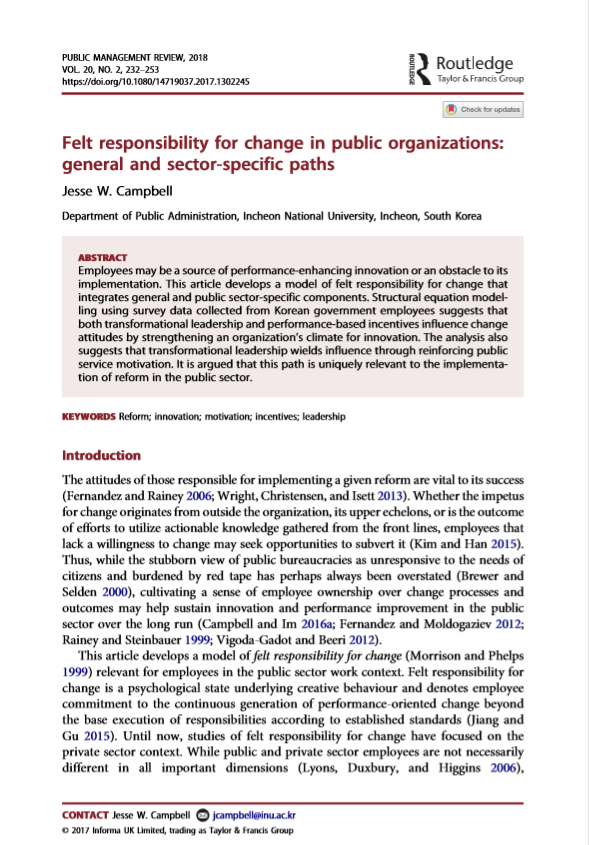 Jesse W. Campbell. (2017) Felt responsibility for change in public organizations: general and sector-specific paths PUBLIC MANAGEMENT REVIEW. VOL. 20, NO. 2, 232–253
Jesse W. Campbell. (2017) Felt responsibility for change in public organizations: general and sector-specific paths PUBLIC MANAGEMENT REVIEW. VOL. 20, NO. 2, 232–253[ABSTRACT] Employees may be a source of performance-enhancing innovation or an obstacle to its implementation. This article develops a model of felt responsibility for change that integrates general and public sector-specific components. Structural equation modelling using survey data collected from Korean government employees suggests that both transformational leadership and performance-based incentives influence change attitudes by strengthening an organization’s climate for innovation. The analysis also suggests that transforational leadership wields influence through reinforcing public service motivation. It is argued that this path is uniquely relevant to the implementation of reform in the public sector. [KEYWORDS] Reform, Innovation, Motivation, Incentives, leadership
2024-03-22
Read More -
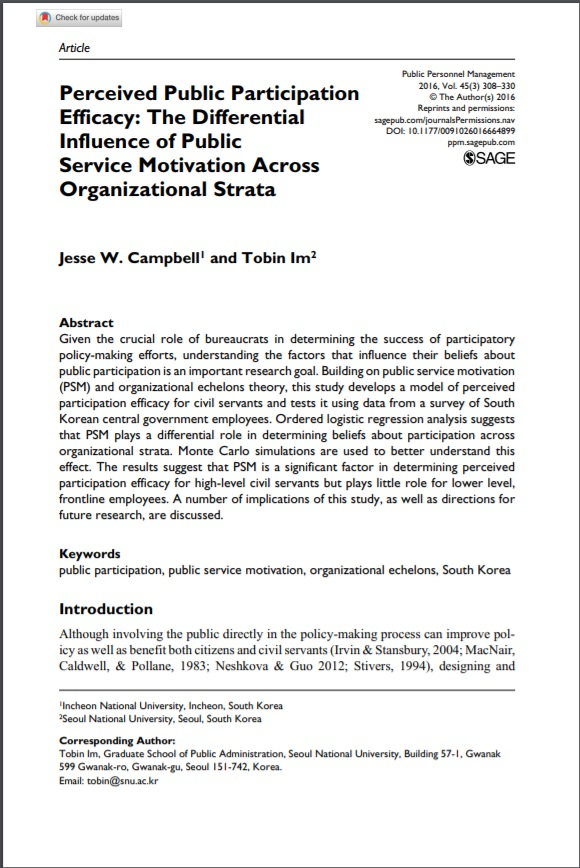 Jesse W. Campbell. & Im, T.. (2016/09) Perceived Public Participation Efficacy : The Differential Influence of Public Service Motivation Across Organizational Strata. Sage Journals, 45(3): 308-330. Public personnel management, 45(3). 308-330(23p)
Jesse W. Campbell. & Im, T.. (2016/09) Perceived Public Participation Efficacy : The Differential Influence of Public Service Motivation Across Organizational Strata. Sage Journals, 45(3): 308-330. Public personnel management, 45(3). 308-330(23p)[Abstract] Given the crucial role of bureaucrats in determining the success of participatory policy-making efforts, understanding the factors that influence their beliefs about public participation is an important research goal. Building on public service motivation (PSM) and organizational echelons theory, this study develops a model of perceived participation efficacy for civil servants and tests it using data from a survey of South Korean central government employees. Ordered logistic regression analysis suggests that PSM plays a differential role in determining beliefs about participation across organizational strata. Monte Carlo simulations are used to better understand this effect. The results suggest that PSM is a significant factor in determining perceived participation efficacy for high-level civil servants but plays little role for lower level, frontline employees. A number of implications of this study, as well as directions for future research, are discussed. [Keywords] public participation, public service motivation, organizational echelons, South Korea
2024-03-22
Read More

